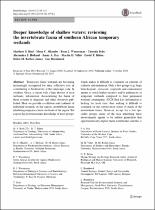| dc.contributor.author | Bird, Mathew, S. | |
| dc.contributor.author | Day, Jenny, A. | |
| dc.contributor.author | Mlambo, Musa, C. | |
| dc.contributor.author | Wasserman, Ryan, J. | |
| dc.contributor.author | Dalu, Tatenda | |
| dc.contributor.author | Holland, Alexandra, J. | |
| dc.contributor.author | Villet, Martin, H. | |
| dc.contributor.author | Bilton, David, T. | |
| dc.contributor.author | Barber-James, Helen, M. | |
| dc.contributor.author | Brendonck, Luc | |
| dc.date.accessioned | 2022-12-05T10:47:47Z | |
| dc.date.available | 2022-12-05T10:47:47Z | |
| dc.date.issued | 2018 | |
| dc.identifier.citation | Bird, M.S., Mlambo, M.C., Wasserman, R.J. et al. Deeper knowledge of shallow waters: reviewing the invertebrate fauna of southern African temporary wetlands. Hydrobiologia 827, 89–121 (2019). https://doi.org/10.1007/s10750-018-3772-z | en_US |
| dc.identifier.uri | http://doi.org/10.1007/s10750-018-3772-z | |
| dc.identifier.uri | http://hdl.handle.net/10566/8216 | |
| dc.description.abstract | Temporary lentic wetlands are becoming
increasingly recognised for their collective role in
contributing to biodiversity at the landscape scale. In
southern Africa, a region with a high density of such
wetlands, information characterising the fauna of
these systems is disparate and often obscurely published.
Here we provide a collation and synthesis of
published research on the aquatic invertebrate fauna
inhabiting temporary lentic wetlands of the region. We
expose the poor taxonomic knowledge of most groups,
which makes it difficult to comment on patterns of
richness and endemism. Only a few groups (e.g. large
branchiopods, ostracods, copepods and cladocerans)
appear to reach higher richness and/or endemicity in
temporary wetlands compared to their permanent
wetland counterparts. IUCN Red List information is
lacking for most taxa, thus making it difficult to
comment on the conservation status of much of the
invertebrate fauna. However, except for a few specialist
groups, many of the taxa inhabiting these
environments appear to be habitat generalists that
opportunistically exploit these waterbodies and this is hypothesised as one of the reasons why endemism
appears to be low for most taxa. Given that taxonomy
underpins ecology, the urgent need for more foundational
taxonomic work on these systems becomes
glaringly apparent. | en_US |
| dc.language.iso | en | en_US |
| dc.publisher | Spring Nature Limited | en_US |
| dc.subject | Aquatic invertebrates | en_US |
| dc.subject | Wetland invertebrates | en_US |
| dc.subject | Ephemeral wetlands | en_US |
| dc.subject | Temporary ponds | en_US |
| dc.subject | Southern Africa | en_US |
| dc.subject | Southern Africa | en_US |
| dc.title | Deeper knowledge of shallow waters: reviewing the invertebrate fauna of southern African temporary wetlands | en_US |
| dc.type | Article | en_US |

